Vitrification – the process of converting something into glass – has long been considered an ideal choice for nuclear waste by regulators internationally, because of its expected durability over hundreds of thousands of years.
GeoMelt® creates ultra-stable glass that is typically 10 times stronger than concrete, and its leach-resistance is among the highest of all materials in the world.
Through vitrification technologies, we offer an economical, practical way to protect the environment from the threats of nuclear and hazardous waste. GeoMelt® is ideal for solid waste and debris.
A safe and cost effective solution
All over the world, an important quantity of waste (such as sodium reactive metals) has been stored for decades, due to the lack of a reliable treatment solution allowing significant chemical & radiological risk reduction in a safe and economical manner.
As part of Veolia's mission to prepare the world of tomorrow by ensuring ecological transformation through innovative technologies, Veolia Nuclear Solutions anticipates possible treatment options for this kind of waste, until then neglected.
GeoMelt® has already demonstrated its effectiveness in a number of cases, such as polluted soils, asbestos or even metallic and reactive waste, thanks to demonstrations carried out on an industrial scale in Japan, the United States and Australia. The aim now is to broaden the range of waste to be treated by adapting the technology for more complex and radiologically dangerous chemical materials.
An optimal solution for waste awaiting treatment anywhere in the world
To this end, Veolia Nuclear Solutions relies on its international network of experts present all over the world as well as on the Veolia Group’s various synergies and expertise.
In order to meet these new challenges, Veolia Nuclear Solutions has adopted a substantial Research & Development program. For example, a GeoMelt® industrial pilot in the United States and a new pilot in France are used to test the effectiveness of our solution on different types of waste.
Several parameters are taken into account, such as the pre-treatment to be carried out to guarantee the safety of the process. In regard to the constraints linked to the storage period of certain types of waste, studies relating to the processes used on vitrified materials will be carried out to validate the durability of the proposed solutions.
Currently, our experts are leading:
Research initiatives concerning the adaptability of GeoMelt® depending on the waste type
Mathematical modeling work to predict the reaction of waste during treatment and the results obtained related to the performance of glass
Lab-scale verification results
Industrial tests on a new pilot system made for this purpose in order to validate the feasibility of using GeoMelt® on a wider scale
This testing phase will be spread over a period of two years after which waste awaiting treatment can be taken care of.




